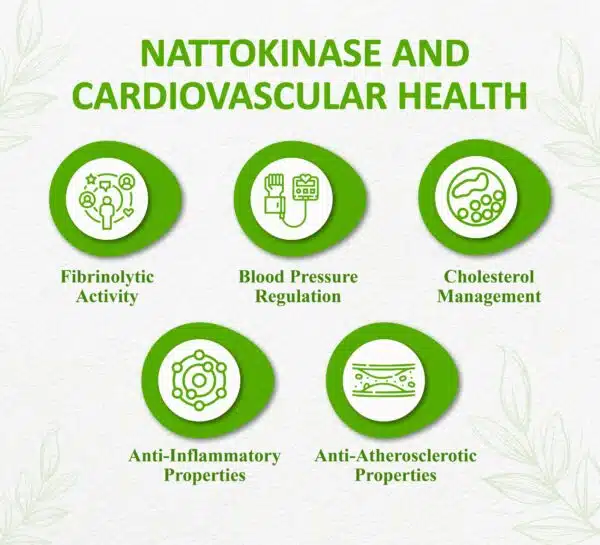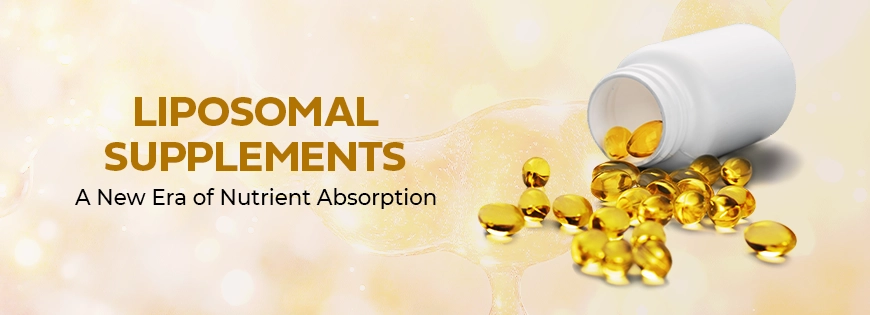Nattokinase, an enzyme extracted from the traditional Japanese food natto, has garnered significant attention for its potential benefits in cardiovascular health. Derived from fermented soybeans, nattokinase has been studied for its fibrinolytic (clot-dissolving) properties, which may offer various heart health benefits. However, as with any supplement, it is crucial to understand both its advantages and potential risks.
Nattokinase and Cardiovascular Health

1. Fibrinolytic Activity
Nattokinase’s most notable property is its potent fibrinolytic activity, which allows it to break down blood clots. This action helps prevent the formation of new clots and promotes the natural breakdown of existing ones. This fibrinolytic activity is particularly beneficial in reducing the risk of cardiovascular events such as heart attacks and strokes.
Mechanism of Action
Nattokinase is an enzyme that helps dissolve blood clots in several ways. Firstly, it directly breaks down fibrin, the protein that forms the structure of blood clots. Additionally, nattokinase converts prourokinase into urokinase (uPA), an enzyme that aids in clot breakdown. It also degrades plasminogen activator inhibitor (PAI-1), a molecule that typically slows the clot-dissolving process. By reducing PAI-1 levels, nattokinase increases the amount of tissue plasminogen activator (t-PA), another enzyme that helps dissolve clots more efficiently. In summary, nattokinase enhances the body’s ability to break down blood clots through multiple pathways.
2. Blood Pressure Regulation
Hypertension, or high blood pressure, is a major risk factor for heart disease. Studies have indicated that nattokinase may help in regulating blood pressure.
In a randomized, controlled trial published in Hypertension Research, researchers studied the effects of nattokinase on blood pressure. They enrolled 86 participants with pre-hypertension or stage 1 hypertension, aged 20 to 80, and gave them either nattokinase or a placebo for 8 weeks. Seventy-three participants completed the study.
Results showed that those who took nattokinase had a significant reduction in both systolic and diastolic blood pressure compared to the placebo group. The study concluded that nattokinase supplementation could help lower blood pressure and may be beneficial in preventing and treating hypertension.
This antihypertensive effect is believed to be due to nattokinase’s ability to inhibit angiotensin-converting enzyme (ACE), which plays a role in blood pressure regulation.
3. Cholesterol Management
Research suggests that nattokinase may have lipid-lowering effects, which can help manage high cholesterol levels. This is beneficial in reducing the risk of cardiovascular disease by preventing the buildup of fat deposits in the arteries.
A systematic review analyzed six studies on nattokinase’s effects on cardiovascular risk factors. The findings showed that nattokinase significantly reduced blood pressure but had mixed effects on cholesterol levels. It was generally safe with no major adverse events reported. The review suggests nattokinase could help manage hypertension, but more research is needed to confirm its impact on cholesterol and determine optimal dosages.
This lipid-lowering effect adds another dimension to nattokinase’s cardiovascular benefits.
4. Anti-Inflammatory Properties
Chronic inflammation is a known contributor to atherosclerosis, thrombosis and other cardiovascular diseases. Nattokinase has been shown to exhibit anti-inflammatory properties by inhibiting inflammatory cytokines and reducing oxidative stress. By mitigating inflammation, nattokinase can help protect against endothelial dysfunction and the progression of cardiovascular diseases.
A study in Redox Biology found that nattokinase (NK) reduces thrombosis by decreasing inflammation and oxidative stress. In mice, NK prevented ear edema and kidney injury. In cells, NK blocked pathways that produce inflammatory molecules. It also lowered PAI-1 levels, preventing fibrin buildup in the kidneys. This suggests NK could be a safer anti-thrombotic treatment by targeting the cycle of inflammation and oxidative stress.
5. Anti-Atherosclerotic Properties
Nattokinase has been found to have anti-atherosclerotic effects, which means it can help prevent and reverse the buildup of plaque in the arteries. This property is essential in preventing the narrowing of arteries, which can lead to heart attacks and strokes.
A study in Frontiers in Cardiovascular Medicine found that a daily dose of 10,800 FU of nattokinase significantly improved cholesterol levels and reduced atherosclerosis in 1,062 participants. NK lowered triglycerides, total cholesterol, LDL-C, and increased HDL-C. It also reduced carotid artery thickness and plaque size. The higher dose was effective and safe, especially when combined with exercise, vitamin K2, and aspirin.
Risks and Considerations
Bleeding Risk:
Given its potent fibrinolytic activity, one of the primary concerns with nattokinase supplementation is the risk of bleeding. Individuals with bleeding disorders, those taking anticoagulant or antiplatelet medications, and those preparing for surgery should exercise caution when considering nattokinase. The enzyme’s ability to break down blood clots can exacerbate bleeding tendencies, potentially leading to severe complications.
A Cureus case study reported a fatal bleeding incident in an elderly woman who took nattokinase, a supplement with blood-thinning properties. Despite its cardiovascular benefits, nattokinase can cause severe bleeding.
The patient, with atrial fibrillation, was not on anticoagulants but used nattokinase. She developed severe bleeding and died from complications. This highlights the need for caution and further research on nattokinase’s safety.
Interaction with Medications:
Nattokinase may interact with various medications, particularly those affecting blood coagulation. For example, combining nattokinase with warfarin, heparin, or aspirin can increase the risk of bleeding.
Additionally, nattokinase might enhance the effects of antihypertensive drugs, potentially leading to hypotension. Therefore, it is essential for individuals on medication to consult with healthcare providers before starting nattokinase supplementation.
Lack of Standardization:
The dietary supplement industry is not as tightly regulated as the pharmaceutical industry, leading to concerns about the purity, potency, and consistency of nattokinase supplements. Variability in enzyme activity among different products can affect their efficacy and safety.
It is crucial to choose supplements from reputable manufacturers that adhere to good manufacturing practices (GMP) and provide third-party testing for quality assurance. We at NaturMed Scientific ensure high quality Nattokinase.
Gastrointestinal Issues:
Some individuals may experience gastrointestinal side effects such as nausea, bloating, and diarrhea when taking nattokinase supplements. These side effects are generally mild and transient but can be bothersome for some users. Starting with a lower dose and gradually increasing it may help mitigate these gastrointestinal issues.
Allergic Reactions:
As nattokinase is derived from soybeans, individuals with soy allergies should avoid nattokinase supplements to prevent allergic reactions. Symptoms of a soy allergy can range from mild (e.g., hives, itching) to severe (e.g., anaphylaxis) and warrant immediate discontinuation of the supplement and medical attention.
Nattokinase presents a promising natural option for supporting cardiovascular health through its fibrinolytic, antihypertensive, lipid-lowering, and anti-inflammatory properties. However, the potential risks, including bleeding, drug interactions, lack of standardization, gastrointestinal issues, and allergic reactions, must be carefully considered. Individuals interested in nattokinase supplementation should seek advice from healthcare professionals, especially if they have preexisting conditions or are taking other medications.
As research continues to evolve, nattokinase may become a more widely accepted component of cardiovascular health management. Until then, it is essential to approach its use with caution and stay informed about the latest scientific developments.
References:
- https://shorturl.at/51tr5
- https://pubmed.ncbi.nlm.nih.gov/18971533/
- https://www.imrpress.com/journal/RCM/24/8/10.31083/j.rcm2408234/htm
- https://pubmed.ncbi.nlm.nih.gov/32193146/
- https://www.ncbi.nlm.nih.gov/pmc/articles/PMC8723721/
- https://www.ncbi.nlm.nih.gov/pmc/articles/PMC6043915/
- https://www.webmd.com/diet/health-benefits-nattokinase
- https://www.webmd.com/vitamins/ai/ingredientmono-1084/nattokinase
Disclaimer: The Statement has not been evaluated by the FDA. This product is not intended to diagnose, treat, cure, or prevent any disease. While the information provided is based on credible references, we do not make any specific claims or guarantees. It is important to consult with your healthcare advisor for personalized advice and guidance related to your health.






